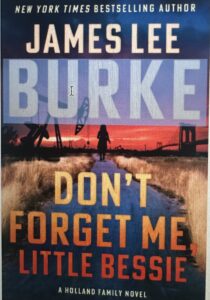James Lee Burke has a new novel out, so, fortunately for Burke fans and anyone looking for a good historical mystery/thriller to read, Bob Moyer has a new review.
Reviewed by Robert P. Moyer
DON’T FORGET ME, LITTLE BESSIE. By James Lee Burke. Atlantic Monthly Press. 360 pages. $28.
 Reading a James Lee Burke novel takes a little longer than reading the average novel. Not that he’s a bad writer. He’s one of the best American novelists writing today. No, it’s his superlative prose – a phrase, a metaphor, a piece of dialogue, a description of landscape – so stunning that it makes the reader stop to admire it. Burke writes sentences no one has heard before.
Reading a James Lee Burke novel takes a little longer than reading the average novel. Not that he’s a bad writer. He’s one of the best American novelists writing today. No, it’s his superlative prose – a phrase, a metaphor, a piece of dialogue, a description of landscape – so stunning that it makes the reader stop to admire it. Burke writes sentences no one has heard before.
All that elegance doesn’t hinder the narrative, however. His prose powers an engaging, unpredictable story, another chapter in the story of the Texas Holland family. He’s written about Hackberry Holland before — drunkard, war hero, former Texas Ranger, womanizer: “The past was always calling him, like specters on horseback beckoning in the distance.” This is the story of his daughter, 14-year-old Bessie. She’s a force of nature who, in the course of this novel set in the early 20th century, shoots a man in the knee, shoots up a saloon, moves to New York, suffers a rape, and comes back home to negotiate an oil lease and start a film company.
Bessie, however, is more than the heroine of a roller-coaster, rollicking tale. This is a James Lee Burke novel, all about good and evil. Bessie is the force of good, who tackles the bad guy, straightens out the saloon habitues, stands up to the sheriff and faces down the big oil company. Although evil takes on many faces in a Burke novel, there is one man who manifests the most evil of all — Indian Charlie, named for all the Indians he killed. He and Bessie have a handful of encounters ending in a final conflagration that tops anything Burke has written before.
As he does in most of his novels, Burke slips in a touch of supernatural, a character named Mr. Slick, who shows up from time to time to help Bessie out of a bind. Bessie has a few visions as well. Burke also puts a perspective on events that resonates with our current battle between good and evil. When Bessie goes to New York, she runs into “… people who call themselves Christians but who are no different than the depraved souls who ran the Inquisition.” Back home in Texas, she encounters “white people” who “…weren’t worth the dustpan it takes to dump them in a wastebasket.” Burke speaks of the times, and to our times, when he writes: “You can burn the written word, but not the spoken one.”
It’s possible that Don’t Forget Me, Little Bessie is the best book in the saga of the Holland family.